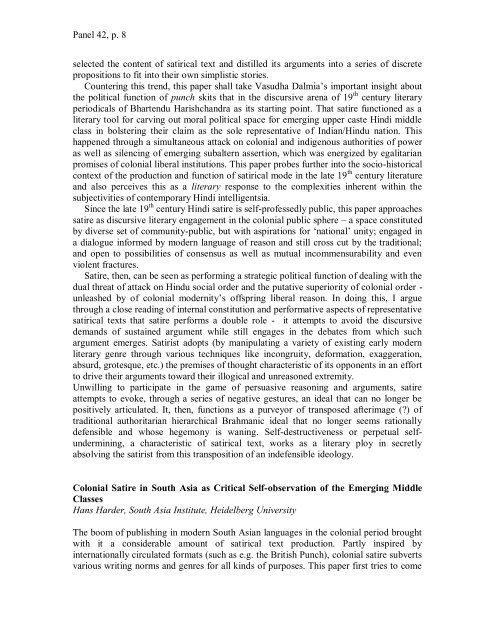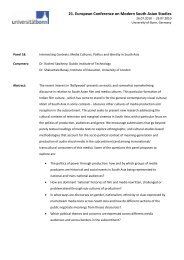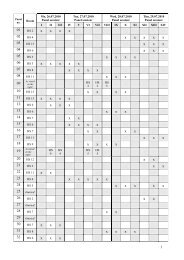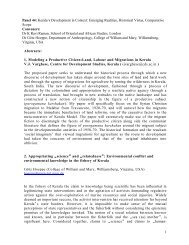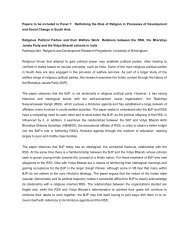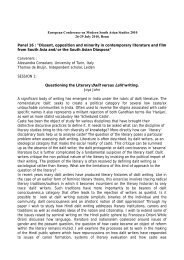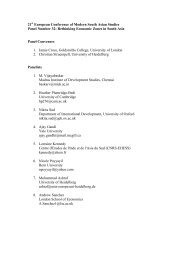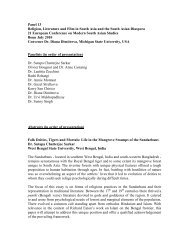Twenty-First European Conference for Modern South Asian Studies,
Twenty-First European Conference for Modern South Asian Studies,
Twenty-First European Conference for Modern South Asian Studies,
Create successful ePaper yourself
Turn your PDF publications into a flip-book with our unique Google optimized e-Paper software.
Panel 42, p. 8<br />
selected the content of satirical text and distilled its arguments into a series of discrete<br />
propositions to fit into their own simplistic stories.<br />
Countering this trend, this paper shall take Vasudha Dalmia‟s important insight about<br />
the political function of punch skits that in the discursive arena of 19 th century literary<br />
periodicals of Bhartendu Harishchandra as its starting point. That satire functioned as a<br />
literary tool <strong>for</strong> carving out moral political space <strong>for</strong> emerging upper caste Hindi middle<br />
class in bolstering their claim as the sole representative of Indian/Hindu nation. This<br />
happened through a simultaneous attack on colonial and indigenous authorities of power<br />
as well as silencing of emerging subaltern assertion, which was energized by egalitarian<br />
promises of colonial liberal institutions. This paper probes further into the socio-historical<br />
context of the production and function of satirical mode in the late 19 th century literature<br />
and also perceives this as a literary response to the complexities inherent within the<br />
subjectivities of contemporary Hindi intelligentsia.<br />
Since the late 19 th century Hindi satire is self-professedly public, this paper approaches<br />
satire as discursive literary engagement in the colonial public sphere – a space constituted<br />
by diverse set of community-public, but with aspirations <strong>for</strong> „national‟ unity; engaged in<br />
a dialogue in<strong>for</strong>med by modern language of reason and still cross cut by the traditional;<br />
and open to possibilities of consensus as well as mutual incommensurability and even<br />
violent fractures.<br />
Satire, then, can be seen as per<strong>for</strong>ming a strategic political function of dealing with the<br />
dual threat of attack on Hindu social order and the putative superiority of colonial order -<br />
unleashed by of colonial modernity‟s offspring liberal reason. In doing this, I argue<br />
through a close reading of internal constitution and per<strong>for</strong>mative aspects of representative<br />
satirical texts that satire per<strong>for</strong>ms a double role - it attempts to avoid the discursive<br />
demands of sustained argument while still engages in the debates from which such<br />
argument emerges. Satirist adopts (by manipulating a variety of existing early modern<br />
literary genre through various techniques like incongruity, de<strong>for</strong>mation, exaggeration,<br />
absurd, grotesque, etc.) the premises of thought characteristic of its opponents in an ef<strong>for</strong>t<br />
to drive their arguments toward their illogical and unreasoned extremity.<br />
Unwilling to participate in the game of persuasive reasoning and arguments, satire<br />
attempts to evoke, through a series of negative gestures, an ideal that can no longer be<br />
positively articulated. It, then, functions as a purveyor of transposed afterimage (?) of<br />
traditional authoritarian hierarchical Brahmanic ideal that no longer seems rationally<br />
defensible and whose hegemony is waning. Self-destructiveness or perpetual selfundermining,<br />
a characteristic of satirical text, works as a literary ploy in secretly<br />
absolving the satirist from this transposition of an indefensible ideology.<br />
Colonial Satire in <strong>South</strong> Asia as Critical Self-observation of the Emerging Middle<br />
Classes<br />
Hans Harder, <strong>South</strong> Asia Institute, Heidelberg University<br />
The boom of publishing in modern <strong>South</strong> <strong>Asian</strong> languages in the colonial period brought<br />
with it a considerable amount of satirical text production. Partly inspired by<br />
internationally circulated <strong>for</strong>mats (such as e.g. the British Punch), colonial satire subverts<br />
various writing norms and genres <strong>for</strong> all kinds of purposes. This paper first tries to come


